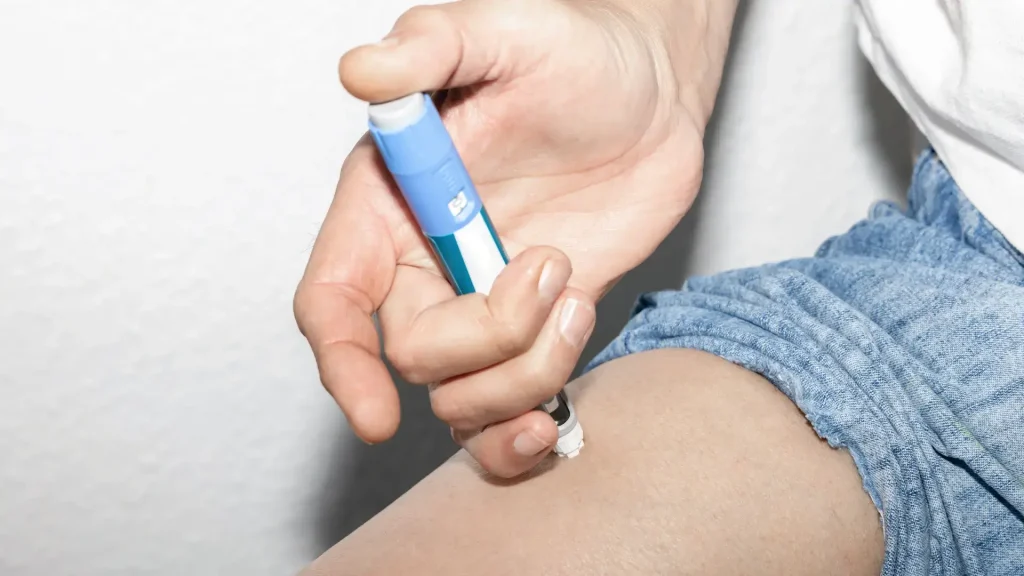A study by Deng et al. (2022) found that treatments with Liraglutide and Semaglutide resulted in weight reductions ranging from 48.2% to 88.7%, showcasing the impressive weight loss potential of these medications in obese or overweight adults without diabetes.
Semaglutide and Liraglutide are glucagon-like peptide-1 (GLP-1) receptor agonists that regulate appetite and promote weight loss. In addition to aiding weight management, they also help improve blood sugar levels in patients with type 2 diabetes. Both medications have been extensively studied, proving their safety and effectiveness in weight management.
In this article, we will compare Semaglutide vs. Liraglutide, examining their efficacy in weight loss, dosing frequency, potential side effects, and patient satisfaction.
Key Takeaways
- When adequately administered with its correct dosing, Semaglutide and Liraglutide aid in weight management by regulating appetite, leading to significant weight loss.
- It’s worth noting that only Semaglutide has FDA-approved oral and injectable formulations, while Liraglutide only has injections.
- Semaglutide and Liraglutide exhibit similar side effects, mainly affecting the gastrointestinal system.
- Semaglutide is generally more cost-effective in long-term use because of its higher efficacy and less frequent dosing.
About: Medica Depot is your trusted all-in-one supplier, offering a range of high-quality medical injectables and supplies. If you’re looking to buy Semaglutide products online, our dedicated sales agents can give you proper guidance. We offer a worry-free experience in searching for the best and most popular products on the market. Whether for health professionals, plastic surgeons, dermatologists, licensed estheticians, or other specialists, we can offer genuine, brand-name products you may need. With Medica Depot, we prioritize serving you better to improve the patient’s quality of life.
Understanding Semaglutide and Liraglutide

Semaglutide and Liraglutide are glucagon-like peptide-1 (GLP-1) receptor agonists commonly used to treat type 2 diabetes and assist with weight loss in individuals struggling with obesity or being overweight. These medications mimic the naturally occurring GLP-1 hormone, which is crucial in regulating appetite and blood sugar levels.
Semaglutide and Liraglutide aid in weight loss by delivering several key benefits:
- Delaying Gastric Emptying: Slows the rate at which food leaves the stomach, promoting satiety.
- Increasing Feelings of Fullness: Enhances the sensation of being full, reducing overall food intake.
- Regulating Appetite: Influences brain signals that control hunger, helping to curb cravings.
These actions contribute to significant weight reduction combined with lifestyle changes such as regular exercise and a reduced-calorie diet. Whether comparing Semaglutide vs Liraglutide or considering alternatives like Semaglutide vs Tirzepatide, it’s important to incorporate these medications into a comprehensive weight management plan for optimal results.
Efficacy Comparison
In adults with overweight or obesity (and at least one related health condition), semaglutide treatment resulted in significant, lasting weight loss over 104 weeks compared to a placebo. On average, body weight decreased by 15.2% in the semaglutide group versus 2.6% in the placebo group.
Additionally, a higher percentage of participants in the semaglutide group achieved at least a 5% weight loss from their starting weight by week 104. On the other hand, Liraglutide helps people with obesity lose and maintain weight
Liraglutide works as well as other treatments and improves blood sugar control. More research is needed to understand its long-term effects and safety. Alongside a recommended diet and exercise, liraglutide typically leads to a weight loss of 4 to 6 kg. Compared to placebo patients, more patients using liraglutide achieve at least 5% and 10% weight loss.
In a STEP 8 trial, adults with overweight or obesity (without diabetes) experienced greater weight loss with once-weekly semaglutide compared to once-daily liraglutide, alongside diet and exercise counseling.
Over 68 weeks, the participants saw an average weight reduction of 15.8% with semaglutide, compared to 6.4% with liraglutide. Individuals must remember that seeking a qualified and licensed medical practitioner can help effectively address their weight loss management journey.
Dosing Frequency and Administration

- Semaglutide Dosage and Dosing Frequency: Semaglutide is available in both oral and injectable formulations, but the injectable form is commonly used for weight loss. It is administered once weekly via subcutaneous injection, starting at 0.25 mg for the first four weeks and gradually increasing to 0.5 mg, 1.0 mg, and up to 2.4 mg as needed, based on the patient’s response and treatment goals.
- Liraglutide Dosage and Dosing Frequency: Liraglutide is administered daily via subcutaneous injection. The dosing begins at 0.6 mg, gradually increasing each week to 1.2 mg, 1.8 mg, and finally reaching the maintenance dose of 2.4 mg. This daily administration requires consistent adherence from the patient to achieve optimal results.
Semaglutide’s once-weekly dosing schedule enhances patient compliance and convenience, making it a preferred option for those seeking long-term weight management. In contrast, Liraglutide’s daily dosing schedule demands greater commitment, which can impact patient preference and adherence, particularly when compared to the less frequent administration of Semaglutide.
Side Effects and Safety Profile

Due to their related active ingredients and mechanisms of action, Semaglutide and Liraglutide share similar side effects. Common side effects include gastrointestinal issues, which often resolve on their own within a few days. Managing symptoms may involve dietary adjustments, proper hydration, smaller meals, and avoiding fatty or spicy foods. Persistent symptoms should be discussed with a healthcare provider, who may recommend over-the-counter remedies.
Both Semaglutide and Liraglutide are considered safe when used under medical supervision. However, Semaglutide’s weekly dosing may result in fewer injection site reactions compared to Liraglutide’s daily administration. Overall, both medications maintain a similar safety profile, making them effective options with manageable side effects for most patients.
Patient Satisfaction and Practical Considerations
In addition to Liraglutide and Semaglutide before and after photos online, clinical studies have highlighted patient satisfaction with their respective treatments. Drugs.com has a user-rating system, allowing patients to rate specific brands, like Wegovy (Semaglutide) and Saxenda (Liraglutide). According to Drugs.com, Wegovy garnered an average of 7.3 stars compared to Saxenda’s 7.6 stars.
Despite their close competition in average ratings, Semaglutide and Liraglutide have showcased their potency, efficacy, and patient safety, resulting in their above-average satisfaction ratings. While both can deliver optimal outcomes with proper adherence to dosage frequency, proper administration, and medical supervision, individuals may also consider their cost comparison.
Semaglutide is generally more cost-effective in long-term use because of its higher efficacy and less frequent dosing. In comparison, Lraglutide, despite its effectiveness, may result in higher costs due to the necessity of daily administration.
Conclusion
Comparing Semaglutide vs Liraglutide shows that both GLP-1 receptor agonists are effective in promoting significant weight loss for those with obesity or overweight. While both medications help regulate appetite and address chronic weight concerns, Semaglutide’s once-weekly dosing offers added convenience over Liraglutide’s daily injections.
Considering factors like efficacy, dosing frequency, and personal preferences can help individuals make informed choices in collaboration with their healthcare providers to achieve their weight management goals.
FAQs
1. What are the key differences between Semaglutide and Liraglutide for weight loss?
Semaglutide and Liraglutide are GLP-1 receptor agonists that manage weight by regulating appetite. However, one key difference is that only Semaglutide has FDA-approved oral and injectable formulations, while Liraglutide is only available in injectable form.
2. What is the efficacy comparison between Semaglutide and Liraglutide for weight loss?
Studies have shown that Semaglutide treatment resulted in significant, lasting weight loss over 104 weeks compared to a placebo. On the other hand, Liraglutide helps people with obesity lose and maintain weight and improve blood sugar control.
3. How do the dosing frequency and administration of Semaglutide and Liraglutide differ?
Semaglutide requires a once-weekly subcutaneous injection, while Liraglutide requires daily administration. Additionally, Semaglutide’s dosing interval enhances patient compliance and convenience, making it a preferred choice for some.
References
- Deng, Y., Park, A., Zhu, L., Xie, W., & Pan, C. Q. (2022). Effect of semaglutide and liraglutide in individuals with obesity or overweight without diabetes: a systematic review. Therapeutic advances in chronic disease, 13, 20406223221108064. https://doi.org/10.1177/20406223221108064
- Garvey, W. T., Batterham, R. L., Bhatta, M., Buscemi, S., Christensen, L. N., Frias, J. P., Jódar, E., Kandler, K., Rigas, G., Wadden, T. A., & Wharton, S. (2022). Two-year effects of semaglutide in adults with overweight or obesity: the STEP 5 trial. Nature Medicine, 28(10), 2083–2091. https://www.nature.com/articles/s41591-022-02026-4








